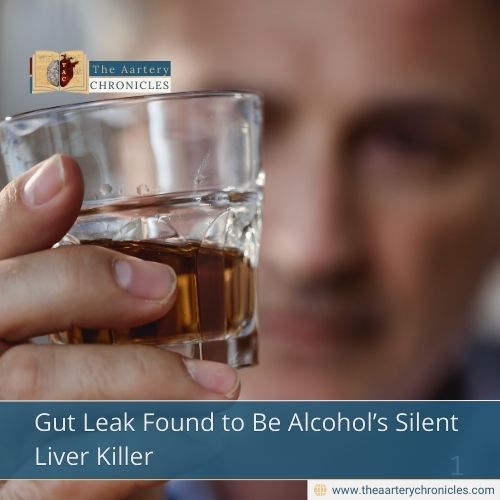

Gut Leak Found to Be Alcohol’s Silent Liver Killer
We often hear that alcohol harms the liver, but new research shows the damage begins even before it reaches that organ. Scientists at the University of California, San Diego, have uncovered how alcohol weakens the gut’s natural barrier, allowing harmful bacteria to leak into the liver and accelerate disease.
This discovery not only explains why alcohol is so damaging but also opens up new possibilities for treatment and prevention.
The Gut–Liver Connection
Our digestive tract is home to billions of bacteria, most of them beneficial. Under normal conditions, a protein known as mAChR4 acts as a gatekeeper. It helps maintain a strong gut barrier, prevents harmful bacteria from escaping, and teaches the immune system how to respond appropriately.
However, with chronic alcohol use, mAChR4 activity is suppressed. This weakens the gut lining and allows bacteria to slip into the liver. Once there, these bacteria worsen the direct toxic effects of alcohol, triggering inflammation, scarring, and ultimately liver disease.
A Hidden Shortcut to Liver Damage
Instead of attacking the liver directly, alcohol takes what researchers call a “hidden shortcut” through the gut. Breaking down the gut’s defences creates a chain reaction of harm that ends in liver damage. This explains why liver injury progresses so aggressively in people with long-term alcohol use.
Can the Damage Be Stopped?
Encouragingly, the study showed that restoring mAChR4 in mice helped repair gut protection. Drugs currently in development were able to reduce bacterial leakage and protect the liver from further harm.
What makes this even more promising is that mAChR4 is also found in brain regions linked to habit formation and addiction. People with alcohol use disorder often have reduced levels of this protein in the brain as well. That means drugs targeting mAChR4 could potentially treat both alcohol-related liver disease and alcohol addiction, a rare two-in-one approach.
Moving Beyond Symptom Management
Most current treatments for alcohol-related liver damage focus on managing complications after they appear. But this research highlights a proactive approach: protecting the gut early to prevent liver disease from taking hold.
Since drugs that activate mAChR4 are already being tested for other conditions, such as schizophrenia, they could potentially be repurposed faster for liver health and alcohol addiction therapy.
Expert Insight
Lead researcher Dr Cristina Llorente emphasises the importance of this gut-first perspective:
“We’re learning that the gut isn’t just along for the ride; it’s actually driving much of the damage we see in the liver. If we can fix that early leak in the system, we may be able to prevent the worst outcomes of alcohol use.”
Key Takeaways
- Alcohol harms the liver by weakening the gut barrier, not just through direct toxicity.
- The protein mAChR4 plays a critical role in keeping gut bacteria in check.
- Restoring mAChR4 could reduce both liver damage and alcohol addiction.
- Protecting the gut may be the key to preventing long-term liver disease.
Conclusion
The findings underline a crucial shift in how we understand alcohol’s impact on health. The gut, once seen as a passive bystander, is now recognised as a central player in liver disease. Strengthening gut protection could transform the way we treat and even prevent the damage alcohol causes.
Source: Inputs from various media Sources
I’m a pharmacist with a strong background in health sciences. I hold a BSc from Delhi University and a pharmacy degree from PDM University. I write articles and daily health news while interviewing doctors to bring you the latest insights. In my free time, you’ll find me at the gym or lost in a sci-fi novel.
- Priya Bairagi
- Health News and Updates,People Forum
- 23 September 2025
- 13:00








